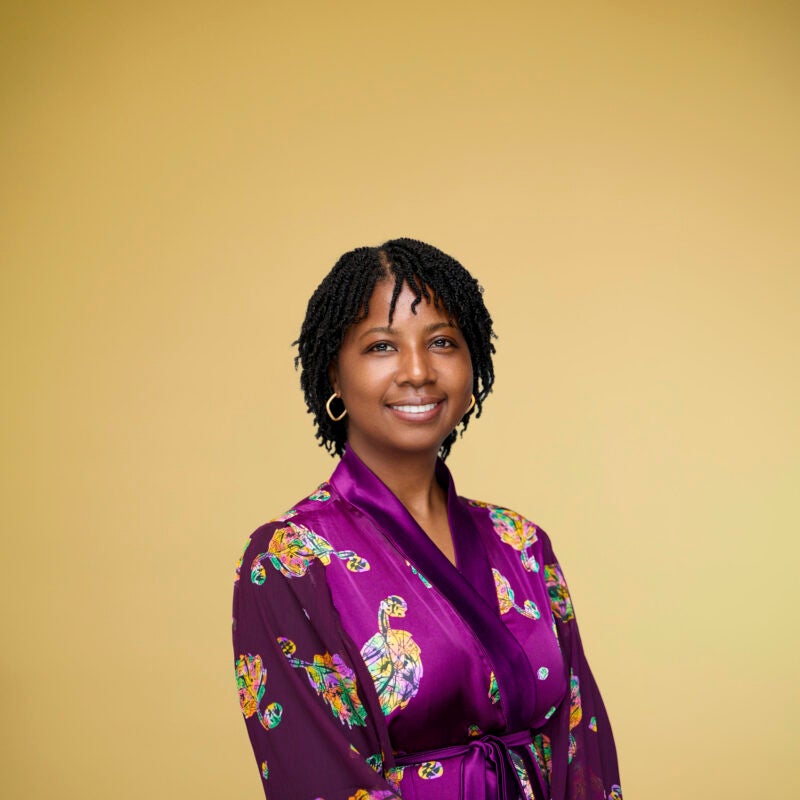Growing up in Accra, Evita Grant ’16 loved playing games with her cousins in the backyard and eating the fresh mango, coconut, and watermelon that were so plentiful in Ghana. But she also loved traveling and seeing the differences in other African countries. In neighboring Côte d’Ivoire, she was struck by the chic fashions in vivid prints.
One year, the family went to Niger for Christmas: “Niger is very much a desert climate,” says Grant. “But that was the first time I ate cantaloupe. I learned there was a whole variety of agricultural products being grown there — it wasn’t just sand and desert.”
Those and many other experiences were formative for Grant, whose perspective was also broadened by attending Ghana International School. In high school, she focused on math, physics, and chemistry, and was accepted to MIT.
She majored in chemical engineering, thinking it would be a useful foundation for a career in manufacturing back home: “My North Star when it comes to my education/career has always been contributing to the economic development of Africa and its global diaspora.”
At MIT, exposure to the medical engineering space made Grant wonder if that could be an area of impact. After graduating in 2006, she enrolled in a joint Harvard-MIT program in health sciences and technology, where she worked on HIV vaccine development and received a Ph.D. in medical engineering and medical physics in 2011.
About halfway through her doctoral thesis, however, Grant realized the high-level medical research she was conducting would be difficult to pull off back home; there wasn’t the necessary infrastructure. In addition, Grant was overqualified for research jobs in Big Pharma yet underqualified for management roles. Despite her high level of education, she needed an additional area of expertise.
A mentor from MIT suggested she consider law — specifically, intellectual property law. Grant got her feet wet by working as a science adviser at a Boston-area firm for a year, then applied to Harvard Law School.
Making a difference in Africa’s future is her North Star.
“Law school helped me realize I’d been in a STEM bubble,” she says. “Discussing social issues in the classroom gave a bit of balance to the engineer and scientist in me.” New options began to percolate in Grant’s head; when she spoke to Professor Ruth Okediji LL.M. ’91 S.J.D. ’96 about her background and desire to make a difference in the African economy, Okediji recommended Professor Mark Wu’s International Trade Law course. Grant loved it.
Wu’s class, when coupled with Grant’s memories of the rich diversity of African goods she experienced when traveling the continent, planted a seed. After receiving her J.D., she moved to Silicon Valley, joining Wilson Sonsini Goodrich & Rosati as a patent attorney focused on innovations in the life sciences; she also performed due diligence for investors.
Immersed in the start-up culture, Grant began to think about a new venture of her own. Like all entrepreneurs, she saw a pain point: the lack of an ecosystem to support African small businesses looking to export their goods.
“I knew there were so many amazing, high-quality African products — but you don’t often see them outside the countries where they’re made,” she says.
There’s a reason for that. Regulatory hurdles make it difficult and expensive to send payments out of African countries, Grant explains; intermediaries often provide this service, but at a cost, and wire transfers are inefficient and pricey. (Grant once paid $400 for a transfer from Ghana to the United States that took nearly three weeks.) As a result, small-business owners often travel directly to the countries where they hope to do business with large quantities of cash — also quite inefficient, to say nothing of the risk involved.
In response, Grant founded TecHustle, a start-up providing financial and technology services to streamline trade for African small businesses. While she incorporated the venture in 2017, Grant continued to research and refine the model for a few more years before leaving her job late in 2020 to work on it full time, launching TecHustle’s payment platform, AFi, in 2022. An online marketplace, Mansa Market, is currently in development, building a roster of merchants selling everything from mango preserves to women’s clothing.
Currently licensed in Ghana and Togo with plans to expand within West Africa and beyond, TecHustle, with a team of eight employees, has already processed well over $3 million in payments. A winner of the 2024 Harvard President’s Innovation Challenge in the Alumni and Affiliates Open Track category, the company has raised $1 million from angel investors, with plans underway for an additional $2 million seed round.
To illustrate TecHustle’s impact, Grant cites a client who grows and dries peppers to sell to spice manufacturers. “He uses our platform to collect short-term debt financing from investors, to pay other farmers for their peppers, and to help his business grow. And as we expand to the United States and Europe, he’s looking forward to collecting payment for his goods back in Ghana. That one client is a local economic engine. He’s employing farmers, farmhands, workers who package the product … his success uplifts so many people in the community.”
Acknowledging the 24/7 nature of scaling a new venture, Grant draws on advice from an investor and mentor: It’s a marathon, not a sprint.
“I understand the challenges,” she says. “There are unknowns. But I think it’s people like me, who are passionate about Africa’s future, who need to lean in to build and develop the continent to its full potential.”
